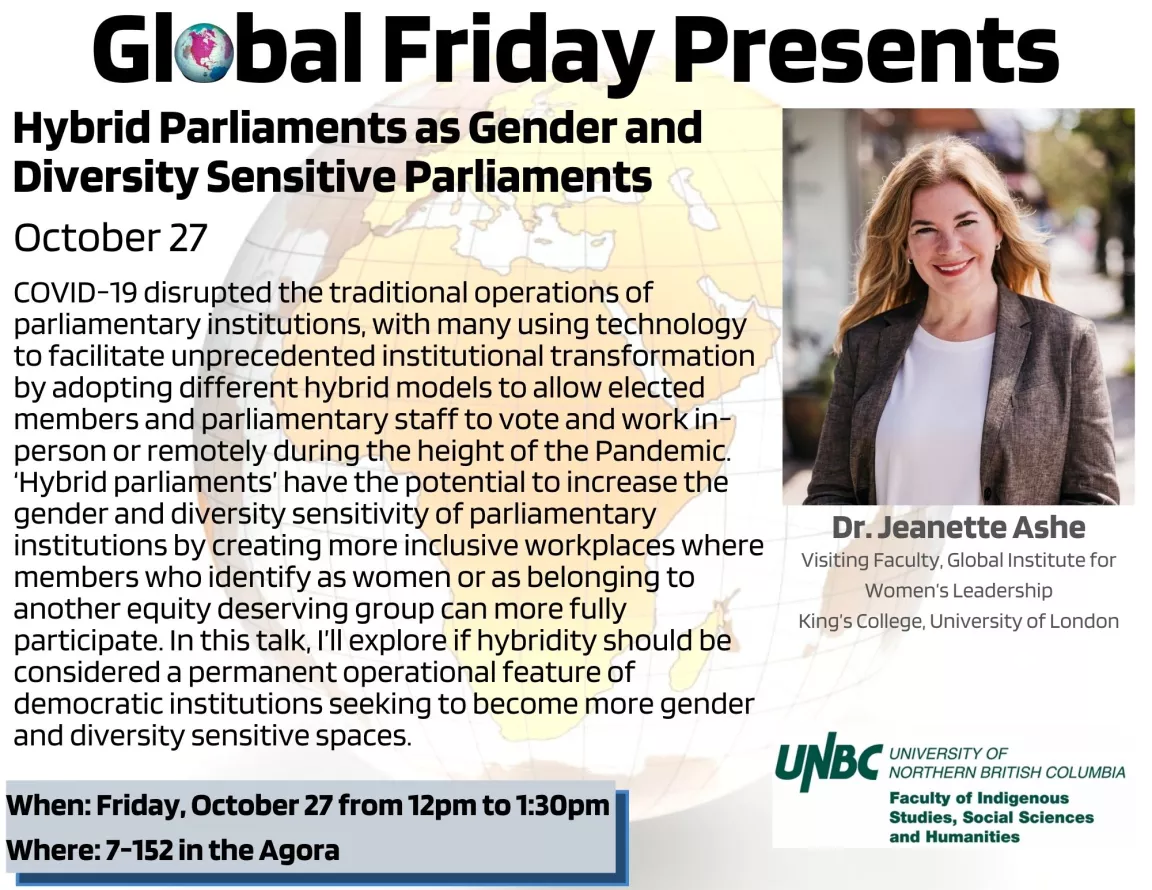Hybrid Parliaments as Gender and Diversity Sensitive Parliaments

Dr. Jeanette Ashe
Visiting Faculty, Global Institute for Women's Leadership, King's College, University of London
Chair, Department of Political Science, Douglas College
Abstract: COVID-19 disrupted the traditional operations of many parliamentary institutions, including the UK’s and Canada’s, with both using technology to facilitate unprecedented institutional transformation by adopting different hybrid models to allow elected members and parliamentary staff to vote and work in-person or remotely during the height of the Pandemic. Looking to the feminist institutionalist approach, ‘hybrid parliaments’ have the potential to increase the gender and diversity sensitivity of parliamentary (G/DSP) institutions by creating more inclusive workplaces where members who identify as women or as belonging to another equity deserving group can more fully participate. House of Commons’ debates on modernising parliamentary practices, in this case, returning to in-person participation or staying with remote-participation, took on normative tones about what makes an ‘effective parliament’ and who makes a ‘good MP’, with conservative parties in both countries more inclined to return to pre-pandemic-styled proceedings. Several years into the pandemic, the Conservative led British Parliament has reverted to in-person proceedings whereas the Liberal led Canadian Parliament has tentatively continued with more restrictive forms of hybridity despite pushback from the Conservative Opposition bench. In this talk, I draw upon my ongoing work in this area including my work with Sarah Childs and Jessica Smith (Edinburgh) where we use our survey and interview data to explore and compare MPs’ levels of support for and experiences with hybridity and if, given the governments’ responses, hybridity has led to greater gender and diversity sensitivity in Canada than in the UK. Doing so provides additional insight into whether hybrid parliamentary reforms should be considered as permanent operational features of democratic institutions seeking to become more gender and diversity sensitive spaces.
Speaker's Bio: Dr. Jeanette Ashe holds a PhD from Birkbeck, University of London, teaches politics at Douglas College, BC, and is visiting faculty at the Global Institute for Women’s Leadership, King’s College, University of London. Her recent book is Political Candidate Selection: Who Wins, Who Loses and Under-representation in the UK (Routledge) and her other current publications include: “Feministing”: Lessons from Bill C-237 – The Candidate Gender Equity Act; The Implementation of Equality-Based Candidate Selection Decisions in the British Labour and Conservative Parties; Canada’s Political Parties: Gatekeepers to Parliament; Gender Sensitivity Under Trudeau: Facebook Feminism or Real Change? Her research can also be found in the Canadian Journal of Political Science, Party Politics, British Politics, and the Journal of Women, Politics & Policy. She advises parliaments, governments, parties, and non-governmental organisations on gender- and diversity-sensitive parliaments, gender equity policy, and democratic reform, and she’s appeared before Parliament as an expert witness on gender and political representation.
Find us on:
Facebook
Twitter
Podcast
Global Fridays gratefully acknowledges funding from the Faculties of Indigenous Studies, Social Sciences and Humanities.